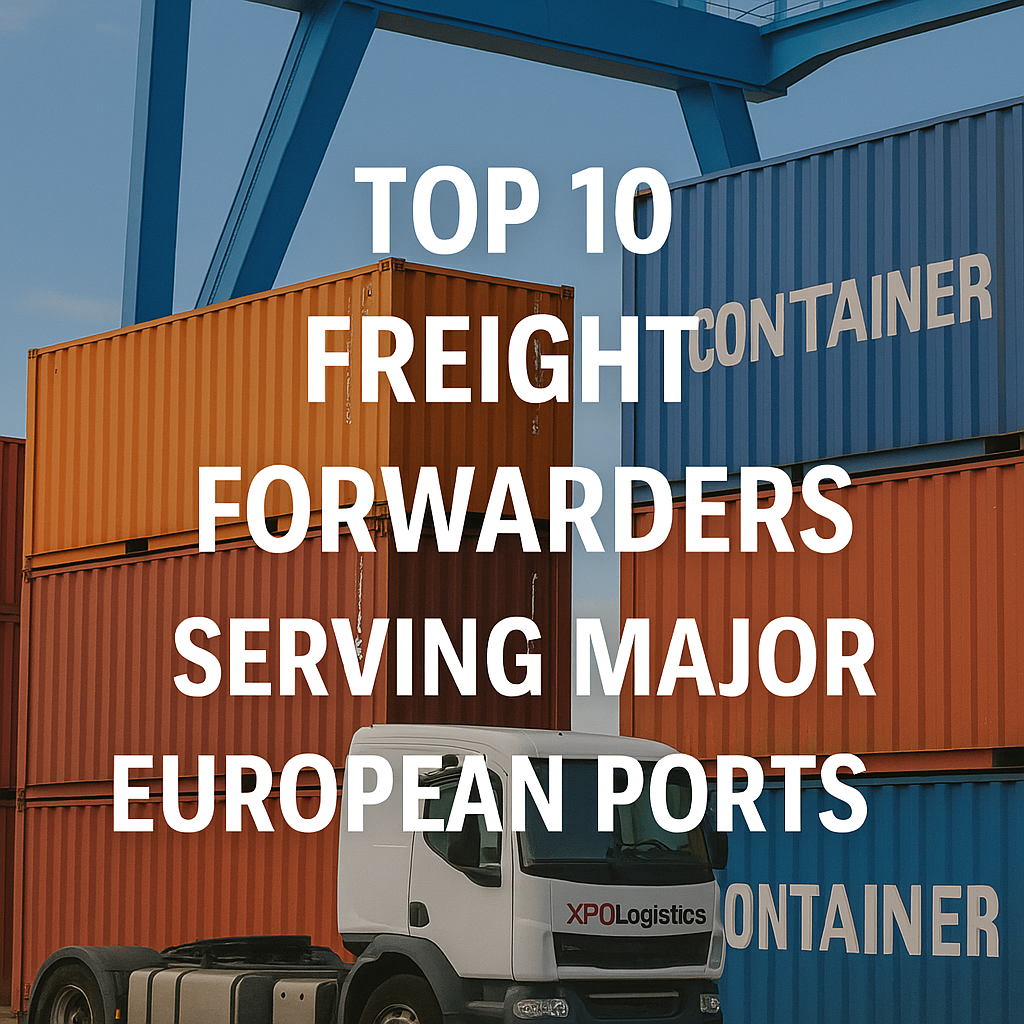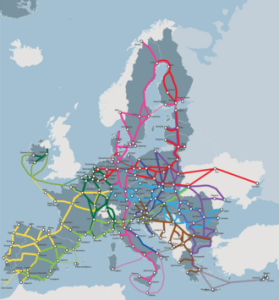Explore the top 10 freight forwarders serving major European ports in 2025. Discover who’s leading the logistics chain across Rotterdam, Hamburg, Antwerp, and more, and how they’re transforming global trade.
Europe’s ports are among the busiest and most strategically important in the world. Rotterdam, Hamburg, Antwerp, Le Havre, and Valencia collectively handle millions of TEUs every year, serving as the gateway between Asia, the Americas, and inland Europe. But behind the towering cranes and container stacks lies a more intricate operation—one powered by freight forwarders.
These logistics specialists orchestrate the movement of goods across complex supply chains, ensuring containers clear customs, reach inland destinations on time, and avoid the ever-present disruptions in global shipping. In this guide, we profile the top 10 freight forwarders operating across Europe’s largest ports in 2025. We examine what sets them apart, how they’re adapting to recent disruptions, and why their role is more critical than ever.
Why Freight Forwarders Are Vital to European Port Operations
Freight forwarders don’t own ships or planes—but they manage everything from booking cargo space to arranging trucking, warehousing, and customs documentation. In a post-pandemic logistics landscape marked by container shortages, Red Sea diversions, and decarbonization mandates, the value of a good forwarder has never been greater.
In 2024, the European Sea Ports Organisation (ESPO) reported over 3.2 billion tonnes of cargo throughput across EU ports. But with delays caused by port congestion, rail strikes, and customs shifts post-Brexit, the ability to adapt—quickly and efficiently—is what makes forwarders so indispensable.

What Makes a Top-Tier Freight Forwarder in 2025?
To rank as one of the top freight forwarders in Europe today, a company must demonstrate:
-
A strong operational presence in Rotterdam, Hamburg, Antwerp, Valencia, or Marseille
-
Expertise in multimodal logistics (sea, road, rail, air)
-
Technology integration: track-and-trace systems, AI-driven optimization, blockchain
-
Compliance with IMO emissions regulations, EU customs standards, and ESG criteria
-
Proven ability to handle high-volume accounts (FCL/LCL, project cargo, reefer containers)
The Top 10 Freight Forwarders Serving Major European Ports
1. DHL Global Forwarding
Headquarters: Bonn, Germany
Core Ports: Rotterdam, Hamburg, Antwerp, Genoa
DHL remains a logistics powerhouse with one of the most extensive global freight networks. Its digital customer portal myDHLi enables full visibility, booking, and emissions tracking. DHL’s strength lies in end-to-end services and integrated customs solutions—especially crucial in post-Brexit Europe.
2. Kuehne + Nagel
Headquarters: Schindellegi, Switzerland
Core Ports: Rotterdam, Antwerp, Le Havre, Hamburg
As one of the top global freight players, Kuehne + Nagel is known for sustainability and tech adoption. Their platform SeaExplorer evaluates routes based on CO₂ emissions. They also provide strong rail connectivity across the Rhine-Alpine corridor and have warehouse hubs near all major EU ports.
3. DSV Panalpina
Headquarters: Hedehusene, Denmark
Core Ports: Rotterdam, Hamburg, Barcelona, Marseille
Since acquiring Panalpina, DSV has expanded its footprint across Europe’s top ports. It offers ocean freight, project logistics, and heavy-lift cargo management with tailored solutions for automotive, pharma, and industrial sectors. Known for its speed and efficiency in container consolidation (LCL).
🔗 DSV
4. DB Schenker
Headquarters: Essen, Germany
Core Ports: Hamburg, Bremerhaven, Antwerp, Zeebrugge
A division of Deutsche Bahn, DB Schenker leverages its strong inland rail connections and offers specialized solutions for time-critical cargo. The company has recently invested in green logistics and digital twin technology to improve ETA accuracy and reduce emissions in last-mile deliveries.
5. Bolloré Logistics (now part of MSC Group)
Headquarters: Puteaux, France
Core Ports: Le Havre, Marseille, Valencia
Following MSC’s acquisition of Bolloré Africa Logistics, Bolloré has increased its presence in Mediterranean ports and is focused on France-Spain-North Africa trade. Strong in pharmaceuticals, aerospace, and temperature-controlled cargo, Bolloré uses a carbon emissions calculator integrated into its online platform.
6. C.H. Robinson Europe
Headquarters: Amsterdam, Netherlands
Core Ports: Rotterdam, Hamburg, Gdynia
While best known in North America, C.H. Robinson has quietly built a solid European presence. Its Navisphere® platform connects shippers with carriers and provides visibility across ocean, rail, and road transport. Its competitive edge is in scalable services for SMEs and rapid customs clearance.
7. GEODIS
Headquarters: Levallois-Perret, France
Core Ports: Antwerp, Marseille, Hamburg, Valencia
GEODIS, a subsidiary of SNCF, focuses on optimizing cross-border logistics through digitally connected supply chains. Their tools support route simulation, risk forecasting, and customs compliance. Strong in automotive and retail cargo across Western Europe.
🔗 GEODIS
8. Sinotrans Europe
Headquarters: Beijing (European operations in Hamburg and Rotterdam)
Core Ports: Hamburg, Rotterdam, Piraeus
A Chinese powerhouse, Sinotrans supports China-EU rail-sea trade corridors via the Belt and Road Initiative. It’s playing an increasingly important role at Hamburg and Piraeus, providing competitive rates for import/export from Asia.
9. Expeditors International of Washington
Headquarters: Seattle, USA
Core Ports: Rotterdam, Hamburg, Felixstowe
Expeditors combines a boutique-style service model with global reach. They offer real-time cargo control towers, customs brokerage, and are especially active in transatlantic trade between EU and North America.
10. Hellmann Worldwide Logistics
Headquarters: Osnabrück, Germany
Core Ports: Bremerhaven, Hamburg, Rotterdam
Hellmann stands out for its agile approach and strong digital integration via Smart Visibility platforms. It supports perishables, chemicals, and cross-border e-commerce. Known for its flexible rate negotiations with shipping lines and port terminals.
🔗 Hellmann
European Main Ports on the Map of the European Transport Corridors(TEN-T) , Credit: Wikipedia
Case Study: Logistics Response During the Red Sea Crisis (2024)
When container ships rerouted around the Cape of Good Hope in early 2024 due to Red Sea piracy threats, Kuehne + Nagel and DSV led successful rerouting and capacity realignment. Clients using their real-time AI-driven platforms reported fewer missed connections and better ETA compliance compared to other providers.
Technologies and Trends Driving Change
Digital twins, AI-based demand forecasting, and blockchain-based document handling have redefined how freight forwarders operate in 2025. Platforms like TradeLens and GSBN are now common tools among forwarders for secure, paperless documentation.
Environmental accountability has also surged. Forwarders like DB Schenker and DHL now offer route optimization based on carbon emissions, aligning with IMO 2023 GHG Strategy and Fit for 55 goals.
FAQ
1. What exactly does a freight forwarder do?
They coordinate the shipping of goods across borders, handling customs, documentation, booking cargo space, and organizing multimodal transport.
2. Are freight forwarders responsible for cargo insurance?
Not directly. However, they often assist in arranging marine cargo insurance or liaise with insurance companies on your behalf.
3. How do freight forwarders help with customs clearance?
Top-tier forwarders have licensed customs brokers on staff and can pre-clear shipments, reduce delays, and navigate complex post-Brexit or EU VAT rules.
4. Do freight forwarders offer visibility tools?
Yes. Most have digital platforms that allow shippers to track cargo in real-time, monitor carbon footprints, and automate documentation.
5. Which ports are the most critical in Europe for freight forwarders?
Rotterdam, Antwerp, Hamburg, Valencia, and Le Havre remain the most vital due to high TEU throughput, rail access, and intermodal infrastructure.
Conclusion
Freight forwarders are the silent enablers of global trade. In 2025, their role has become even more indispensable in light of rising geopolitical uncertainty, environmental regulation, and shifting consumer demands. The best forwarders offer not just logistics—but agility, technology, and trust.
Whether you’re a small exporter or a multinational shipper, aligning with a top-tier forwarder operating in Europe’s major ports ensures fewer delays, better compliance, and a smoother path through the global supply chain.
🔍 Choose strategically. Ship smart. Grow globally.



Thank you .